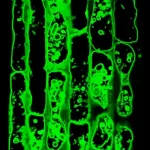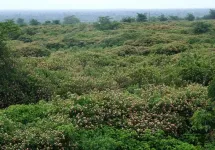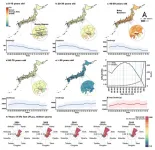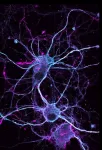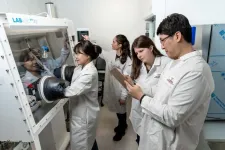(Press-News.org) In a groundbreaking discovery, researchers from Nagoya University in Japan and the Slovak Academy of Sciences have unveiled new insights into the interplay between quantum theory and thermodynamics. The team demonstrated that while quantum theory does not inherently forbid violations of the second law of thermodynamics, quantum processes may be implemented without actually breaching the law. This discovery, published in npj Quantum Information, highlights a harmonious coexistence between the two fields, despite their logical independence. Their findings open up new avenues for understanding the thermodynamic boundaries of quantum technologies, such as quantum computing and nanoscale engines.
This breakthrough contributes to the long-standing exploration of the second law of thermodynamics, a principle often regarded as one of the most profound and enigmatic in physics. The second law asserts that entropy—a measure of disorder in a system—never decreases spontaneously. It also states that a cyclically operating engine cannot produce mechanical work by extracting heat from a single thermal environment and underscores the concept of a unidirectional flow of time.
Despite its foundational role, the second law remains one of the most debated and misunderstood principles in science. Central to this debate is the paradox of “Maxwell's Demon,” a thought experiment proposed by physicist James Clerk Maxwell in 1867.
Maxwell envisioned a hypothetical being—the demon—capable of sorting fast and slow molecules within a gas at thermal equilibrium without expending energy. By separating these molecules into distinct regions, the demon could create a temperature difference. As the system returns to equilibrium, mechanical work is extracted, seemingly defying the second law of thermodynamics.
The paradox has intrigued physicists for over a century, raising questions about the law’s universality and whether it depends on the observer’s knowledge and capabilities. Solutions to the paradox have largely centered on treating the demon as a physical system subject to thermodynamic laws. A proposed solution is erasing the demon’s memory, which would require an expenditure of mechanical work, effectively offsetting the violation of the second law.
To explore this phenomenon further, the researchers developed a mathematical model for a “demonic engine,” a system powered by Maxwell’s demon. Their approach is rooted in the theory of quantum instruments, a framework introduced in the 1970s and 1980s to describe the most general forms of quantum measurement.
The model involves three steps: the demon measures a target system, then extracts work from it by coupling it to a thermal environment, and finally erases its memory by interacting with the same environment.
Using this framework, the team derived precise equations for the work expended by the demon and the work it extracts, expressed in terms of quantum information measures such as von Neumann entropy and Groenewold-Ozawa information gain. When comparing these equations, they got a surprising result.
“Our results showed that under certain conditions permitted by quantum theory, even after accounting for all costs, the work extracted can exceed the work expended, seemingly violating the second law of thermodynamics,” explained Shintaro Minagawa, a lead researcher on the project. “This revelation was as exciting as it was unexpected, challenging the assumption that quantum theory is inherently ‘demon-proof.’ There are hidden corners in the framework where Maxwell’s Demon could still work its magic.”
Despite these loopholes, the researchers emphasize that they don't pose a threat to the second law. “Our work demonstrates that, despite these theoretical vulnerabilities, it is possible to design any quantum process so that it complies with the second law,” said Hamed Mohammady. “In other words, quantum theory could potentially break the second law of thermodynamics, but it doesn't actually have to. This establishes a remarkable harmony between quantum mechanics and thermodynamics: they remain independent but never fundamentally at odds.”
This discovery also suggests that the second law does not impose strict limitations on quantum measurements. Any process permitted by quantum theory can be implemented without violating thermodynamic principles. By refining our understanding of this interplay, the researchers aim to unlock new possibilities for quantum technologies while upholding the timeless principles of thermodynamics.
“One thing we show in this paper is that quantum theory is really logically independent of the second law of thermodynamics. That is, it can violate the law simply because it does not ‘know’ about it at all,” Francesco Buscemi explained. “And yet—and this is just as remarkable—any quantum process can be realized without violating the second law of thermodynamics. This can be done by adding more systems until the thermodynamic balance is restored.” The implications of this study extend beyond theoretical physics. Illuminating the thermodynamic limits of quantum systems provides a foundation for innovations in quantum computing and nanoscale engines. As we explore the quantum realm, this research serves as a reminder of the delicate balance between the fundamental laws of nature and the potential for groundbreaking technological advancements.
END
No quantum exorcism for Maxwell's demon (but it doesn't need one)
2025-02-07
ELSE PRESS RELEASES FROM THIS DATE:
Balancing the pressure: How plant cells protect their vacuoles
2025-02-07
Plants droop and shed their leaves when parched, but with a splash of water, their stems regain strength and their leaves unfurl. This dramatic transformation is a clear signal for us to reach for the watering can – and it demonstrates a delicate balance at the cellular level, which lies at the heart of plant’s rigidity.
The structural support of a plant depends on the unique balance between two elements: The strong, flexible cell wall provides structural support, while the vacuole, a large cellular compartment filled with water, acts like a water balloon, pressing against the cell wall. The delicate pressure balance between the inside and the ...
Electronic reporting of symptoms by cancer patients can improve quality of life and reduce emergency visits
2025-02-07
CHAPEL Hill, N.C.—People with metastatic cancer who regularly report their symptoms via a home-based electronic monitoring system experienced improved quality of life, clinical outcomes and well-being, as well as fewer emergency department visits than those who didn’t file reports. Both groups had similar overall survival rates, according to University of North Carolina Lineberger Comprehensive Cancer Center researchers and their colleagues.
The results from the national multicenter study appeared in Nature Medicine on Feb. 7.
“Doctors and nurses are often ...
DNA barcodes and citizen science images map spread of biocontrol agent for control of major invasive shrub
2025-02-07
New CABI-led research using publicly-shared DNA barcodes and citizen science images have provided new evidence on the establishment and spread of a biological control agent used for the control of the major invasive shrub Lantana camara.
Lantana camara was introduced as a garden and ornamental plant throughout the tropics and subtropics but is now pervasive throughout the Old World, invading woodlands, forestry, orchards, grasslands, and disturbed areas, where is displaces useful and indigenous plants.
Dr Matthew Cock, CABI Emeritus Fellow, and colleagues took DNA barcodes from the Barcode of Life Data System (BOLD) and citizen ...
Pregnancy complications linked to cardiovascular disease in the family
2025-02-07
Women who have experienced pregnancy complications have an increased risk of cardiovascular disease. Now, a new study from Karolinska Institutet published in the European Heart Journal shows that sisters of women with complicated pregnancies are also at higher risk, even if they had uncomplicated pregnancies. The findings suggest that genes and shared environmental factors may influence the association between pregnancy complications and cardiovascular disease risk.
It is well known that complications during pregnancy, such as high blood pressure and premature labour, increase the risk of cardiovascular disease later in life. However, it is unknown whether ...
Pancreatic cancer immune map provides clues for precision treatment targeting
2025-02-07
Pancreatic cancer patients may benefit from future precision treatments as a new study shows how some tumours may potentially be more susceptible to macrophage-based therapies.
The study which is published in Nature Communications was led by Associate Professor Shivan Sivakumar from the University of Birmingham and Associate Professor Rachael Bashford-Rogers at the University of Oxford and provides the most detailed immune map for pancreatic cancer. The findings suggest that some tumour cells ...
How neighborhood perception affects housing rents: A novel analytical approach
2025-02-07
Housing rents usually correlate with factors such as the building’s age, facilities, and location. Yet not all rentals with similar physical factors charge the same rent. Psychological factors such as the subjective perceptions of the neighborhood matter as well.
Considering these perception variables, an Osaka Metropolitan University team has developed a method with almost 75% accuracy in explaining housing prices in Osaka City.
The team led by Graduate School of Human Life and Ecology student Xiaorui Wang and Professor Daisuke Matsushita used existing Osaka City property datasets and incorporated additional information on the physical factors (sky, vegetation, and buildings) of ...
Many adults report inaccurate beliefs about risks and benefits of home firearm access
2025-02-07
About 40% of households in the United States report firearm access and the majority of firearm owners report typically storing at least one of their firearms unsecured.
The most common reason individuals provide for when asked why they store firearms unsecured is defense, with many reporting that firearms are unrelated to suicide risk despite robust data to the contrary.
A new study by the New Jersey Gun Violence Research Center clarified the extent to which U.S. adults exhibit skewed perceptions of risk and safety by collecting a nationally representative sample of 8,009 adults in May and asking participants about the extent to which they believe ...
Air pollution impacts an aging society
2025-02-07
Air pollution is a growing health issue worldwide, and its impacts are often underestimated in aging societies like Japan. A new study led by researchers from the University of Tokyo highlights how fine particulate pollution, or PM2.5, not only worsens health outcomes, but also creates significant socioeconomic challenges in regions with aging populations and limited medical resources. The researchers hope these findings motivate policymakers to tackle the interrelated issues behind this problem.
PM2.5 refers to microscopic particles of pollution small enough to penetrate deep into the lungs and bloodstream, leading to severe respiratory and cardiovascular ...
UC Davis researchers achieve total synthesis of ibogaine
2025-02-07
Ibogaine — a psychoactive plant derivative — has attracted attention for its anti-addictive and anti-depressant properties. But ibogaine is a finite resource, extracted from plants native to Africa like the iboga shrub (Tabernanthe iboga) and the small-fruited voacanga tree (Voacanga africana). Further, its use can lead to irregular heartbeats, introducing safety risks and an overall need to better understand how its molecular structure leads to its biological effects.
In a study appearing in Nature Chemistry, researchers at the University ...
Building better biomaterials for cancer treatments
2025-02-07
Modifying the physical characteristics of microscopic biomaterials to interact seamlessly with the body’s tissues could unlock safer and more effective cancer treatments, according to Virginia Tech researchers at the Fralin Biomedical Research Institute at VTC.
In an online review slated for the Feb. 10 issue of the Journal of Controlled Release, a research team led by DaeYong Lee, an assistant professor with the institute’s Cancer Research Center in Roanoke, highlighted how slight changes in therapeutic ...

